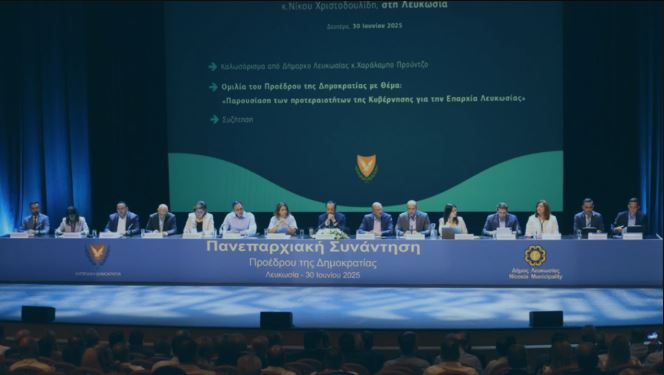President Nikos Christodoulides on Monday announced plans to fund 80 projects with a total cost of more than €1 billion to support the development of the capital.
“Despite its potential and development potential, Nicosia is not unaffected by the challenges faced by all modern urban centres”, Christodoulides said in his speech at the Nicosia University conference.
“Nicosia plays a key role in services, education, and research,” he said.
He outlined key challenges facing Nicosia, including housing pressures, traffic congestion, and gaps in social cohesion, with funding set to target areas such as health, education, transport, and social policy and presented a series of planned projects across sectors.
In terms of housing and urban development, plans included student residences, commercial spaces, and an innovation zone, with a committee set to assess feasibility and financing by early 2026.
In the cultural sector, he mentioned the €144 million Archaeological Museum, which was set to open in 2028 and a new cultural agreement with the Nicosia municipality. Key sites like Famagusta Gate and the Nicosia Municipal Theatre would also be upgraded, while the Ledra archaeological site would soon open to the public.
On education, the president announced a series of measures across all levels.
The all-day school program was set to expand to 60 additional primary schools in 2025-2026, including 25 in Nicosia, with the aim of full nationwide coverage by 2028. Summer schools, the President said, would be introduced in all special schools, including two in the capital.
Additionally, a pilot technical gymnasium was set to start its operations 2025-2026, with one of the model schools based at Ayios Stylianos in Nicosia and a new technical school in the Dali area was currently being planned.
Further plans, the President said, included the conversion of 25 schools into zero-energy buildings by 2027 with five already completed in the Nicosia area.
In terms of higher education, Christodoulides said plans for the National Kapodistrian University of Athens to open a branch in central Nicosia continued and the creation of 380 student dormitories within the city walls would be supported with a funding of €15 million.
The president said upgrades were planned at both Nicosia General and Makarios Hospitals, as part of wider investments in the health sector. At Nicosia General, a €14.5 million development plan would include, among other projects, a new Neurology Clinic and a Stroke Unit. At Makarios Hospital, plans included the construction of a new children’s accident and emergency department and a paediatric oncology clinic.
A wave of transport and environmental projects was said to be underway across Nicosia, including upgrades to the Nicosia-Troodos and Nicosia-Paleochori motorways, the latter expected by early 2027.
“We are in a period of substantial reform of the capital and our wider urban areas, through the upgrade of infrastructure and the strengthening of the transport network”, the President said.
Plans, he said, included a 6.2 kilometre route linking Tseri and Strovolos would add cycle lanes, green spaces and a new bridge. Other measures focused on improving water use, restoring waste sites and expanding recycling access through green kiosks and repair centres.
“In order to shield the city against climate challenges, flood protection projects are also being implemented in the Nicosia city centre, Ayioi Omologites, Pallouriotissa and Lycabettus”, he said, adding that completion was due between 2025 and 2026.
Plans would also include a series of sports infrastructure projects, such as the planned renovation of the Aglantzia pool and the redevelopment of the Makarios Sports Centre.
The upgrade of the Pournara reception centre was also highlighted, with the €26.5 million project now 85 per cent complete and due for completion in summer 2025. Fully funded by the EU, it is set to expand capacity to 2,000 people and include new emergency facilities.
The president also announced a new day care centre for people with disabilities over 21, along with two independent living homes for people with autism. Funded by Eurobank Group, he said the €2 million project would be run by the Deputy Ministry of Social Welfare. Additionally, a separate day care program would be submitted to the Cabinet next week.
Aside from plans in urban and suburban Nicosia, the president said €2.5 million in grants had been approved for local authorities in rural and mountainous areas, along with €370,000 for private businesses in those regions.






Click here to change your cookie preferences